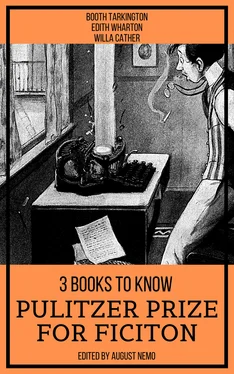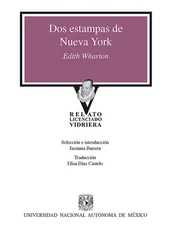“They're coming,” said his son; and, casting himself heavily into a chair, stared at the fire.
His prediction was verified a few moments later; the two ladies came in cheerfully, unfastening their fur cloaks. “It's all right, Georgie,” said Isabel. “Your Uncle George called to us that Pendennis got home safely. Put your shoes close to the fire, dear, or else go and change them.” She went to her husband and patted him lightly on the shoulder, an action which George watched with sombre moodiness. “You might dress before long,” she suggested. “We're all going to the Assembly, after dinner, aren't we? Brother George said he'd go with us.”
“Look here,” said George abruptly. “How about this man Morgan and his old sewing-machine? Doesn't he want to get grandfather to put money into it? Isn't he trying to work Uncle George for that? Isn't that what he's up to?”
It was Miss Fanny who responded. “You little silly!” she cried, with surprising sharpness. “What on earth are you talking about? Eugene Morgan's perfectly able to finance his own inventions these days.”
“I'll bet he borrows money of Uncle George,” the nephew insisted.
Isabel looked at him in grave perplexity. “Why do you say such a thing, George?” she asked.
“He strikes me as that sort of man,” he answered doggedly. “Isn't he, father?”
Minafer set down his paper for the moment. “He was a fairly wild young fellow twenty years ago,” he said, glancing at his wife absently. “He was like you in one thing, Georgie; he spent too much money—only he didn't have any mother to get money out of a grandfather for him, so he was usually in debt. But I believe I've heard he's done fairly well of late years. No, I can't say I think he's a swindler, and I doubt if he needs anybody else's money to back his horseless carriage.”
“Well, what's he brought the old thing here for, then? People that own elephants don't take them elephants around with 'em when they go visiting. What's he got it here for?”
“I'm sure I don't know,” said Mr. Minafer, resuming his paper. “You might ask him.”
Isabel laughed, and patted her husband's shoulder again. “Aren't you going to dress? Aren't we all going to the dance?”
He groaned faintly. “Aren't your brother and Georgie escorts enough for you and Fanny?”
“Wouldn't you enjoy it at all?”
“You know I don't.”
Isabel let her hand remain upon his shoulder a moment longer; she stood behind him, looking into the fire, and George, watching her broodingly, thought there was more colour in her face than the reflection of the flames accounted for. “Well, then,” she said indulgently, “stay at home and be happy. We won't urge you if you'd really rather not.”
“I really wouldn't,” he said contentedly.
Half an hour later, George was passing through the upper hall, in a bath-robe stage of preparation for the evening's' gaieties, when he encountered his Aunt Fanny. He stopped her. “Look here!” he said.
“What in the world is the matter with you?” she demanded, regarding him with little amiability. “You look as if you were rehearsing for a villain in a play. Do change your expression!”
His expression gave no sign of yielding to the request; on the contrary, its somberness deepened. “I suppose you don't know why father doesn't want to go tonight,” he said solemnly. “You're his only sister, and yet you don't know!”
“He never wants to go anywhere that I ever heard of,” said Fanny. “What is the matter with you?”
“He doesn't want to go because he doesn't like this man Morgan.”
“Good gracious!” Fanny cried impatiently. “Eugene Morgan isn't in your father's thoughts at all, one way or the other. Why should he be?”
George hesitated. “Well—it strikes me—Look here, what makes you and—and everybody—so excited over him?”
“Excited!” she jeered. “Can't people be glad to see an old friend without silly children like you having to make a to-do about it? I've just been in your mother's room suggesting that she might give a little dinner for them—”
“For who?”
“For whom, Georgie! For Mr. Morgan and his daughter.”
“Look here!” George said quickly. “Don't do that! Mother mustn't do that. It wouldn't look well.”
“Wouldn't look well!” Fanny mocked him; and her suppressed vehemence betrayed a surprising acerbity. “See here, Georgie Minafer, I suggest that you just march straight on into your room and finish your dressing! Sometimes you say things that show you have a pretty mean little mind!”
George was so astounded by this outburst that his indignation was delayed by his curiosity. “Why, what upsets you this way?” he inquired.
“I know what you mean,” she said, her voice still lowered, but not decreasing in sharpness. “You're trying to insinuate that I'd get your mother to invite Eugene Morgan here on my account because he's a widower!”
“I am?” George gasped, nonplussed. “I'm trying to insinuate that you're setting your cap at him and getting mother to help you? Is that what you mean?”
Beyond a doubt that was what Miss Fanny meant. She gave him a white-hot look. “You attend to your own affairs!” she whispered fiercely, and swept away.
George, dumfounded, returned to his room for meditation.
He had lived for years in the same house with his Aunt Fanny, and it now appeared that during all those years he had been thus intimately associating with a total stranger. Never before had he met the passionate lady with whom he had just held a conversation in the hall. So she wanted to get married! And wanted George's mother to help her with this horseless-carriage widower!
“Well, I will be shot!” he muttered aloud. “I will—I certainly will be shot!” And he began to laugh. “Lord 'lmighty!”
But presently, at the thought of the horseless-carriage widower's daughter, his grimness returned, and he resolved upon a line of conduct for the evening. He would nod to her carelessly when he first saw her; and, after that, he would notice her no more: he would not dance with her; he would not favour her in the cotillion—he would not go near her!
He descended to dinner upon the third urgent summons of a coloured butler, having spent two hours dressing—and rehearsing.
The Honourable George Amberson was a congressman who led cotillions—the sort of congressman an Amberson would be. He did it negligently, tonight, yet with infallible dexterity, now and then glancing humorously at the spectators, people of his own age. They were seated in a tropical grove at one end of the room whither they had retired at the beginning of the cotillion, which they surrendered entirely to the twenties and the late 'teens. And here, grouped with that stately pair, Sydney and Amelia Amberson, sat Isabel with Fanny, while Eugene Morgan appeared to bestow an amiable devotion impartially upon the three sisters-in-law. Fanny watched his face eagerly, laughing at everything he said; Amelia smiled blandly, but rather because of graciousness than because of interest; while Isabel, looking out at the dancers, rhythmically moved a great fan of blue ostrich feathers, listened to Eugene thoughtfully, yet all the while kept her shining eyes on Georgie.
Georgie had carried out his rehearsed projects with precision, he had given Miss Morgan a nod studied into perfection during his lengthy toilet before dinner. “Oh, yes, I do seem to remember that curious little outsider!” this nod seemed to say. Thereafter, all cognizance of her evaporated: the curious little outsider was permitted no further existence worth the struggle. Nevertheless, she flashed in the corner of his eye too often. He was aware of her dancing demurely, and of her viciously flirtatious habit of never looking up at her partner, but keeping her eyes concealed beneath downcast lashes; and he had over-sufficient consciousness of her between the dances, though it was not possible to see her at these times, even if he had cared to look frankly in her direction—she was invisible in a thicket of young dresscoats. The black thicket moved as she moved and her location was hatefully apparent, even if he had not heard her voice laughing from the thicket. It was annoying how her voice, though never loud, pursued him. No matter how vociferous were other voices, all about, he seemed unable to prevent himself from constantly recognizing hers. It had a quaver in it, not pathetic—rather humorous than pathetic—a quality which annoyed him to the point of rage, because it was so difficult to get away from. She seemed to be having a “wonderful time!”
Читать дальше












